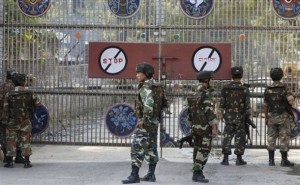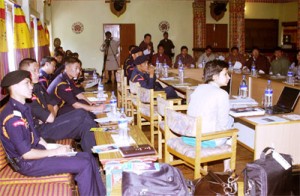One Year of Democracy and National Security
Walking down history lanes years later, the year 2008 will go down as a remarkable year for Bhutan. That year, a King was crowned and a Prime Minister was elected. There were also many worthy firsts in 2008 – first Constitution in the history of the kingdom, the first democratic elections based on adult franchise, first democratically elected government, first coronation of a king graced by a former king, first centenary of monarchy, the first resettlement of Bhutanese refugees abroad and also the first of a series of bomb blasts that threatens to leave Bhutan’s fragile democratic transition out in the cold by elements fighting for a ‘real democracy’. Overall, the year 2000 was a year of some hope and some missed opportunities.
It was hoped in the beginning, that the onset of democracy would be a panacea to some of Bhutan’s ills. There was this strategic possibility that the initial euphoria generated by democracy could be used as a conduit to hammer out unsettled matters and return to normalcy. With a little political will, and an honest resolve to turn the country back on track, the RGOB could have exploited that rare, perfect opportunity to reach out to the political parties in exile and begin the necessary ‘confidence building measures’. The platform of democracy could have been used to raise another platform – that of ‘national reconciliation’. It was important to seize this opportunity and save Bhutan from being swallowed up in the whirlpool of policy misadventures of the past and to start a fresh national reconstruction process. Unfortunately, for Bhutan, its rulers once again chose to deny that path and in the process missed that golden opportunity.
That the ushering of democracy should be met with an intensified fight for ‘real democracy’ is an interesting reality – a testimony to the fact, that elections can happen anywhere, but just holding elections is not democracy. Call it ‘election’ or ‘democracy’, in Bhutan, they mean nothing but an outward pretense; a regime’s clever attempt to blow off its totalitarian image.
If anything, the regime’s version of democracy is incomplete, half done and imperfect. It is neither representative, transformative nor inclusive. Rather, it is deceitful and aims to preserve the political status quo of the past. This democracy still curtails freedoms and excludes people from the ballot. Over a hundred thousand southern Bhutanese were disenfranchised in 2008 elections. Much worse, the fear of an imminent eviction looms large over a large section of the southern Bhutanese population, even today.
So, Bhutan’s largely neglected and suppressed southern Bhutanese population have a reason to believe that the ‘guided democracy’ masterminded by Bhutan’s fourth king is no tranquilizer to their problems. Bhutan still continues to catch hold of their ‘cultural knot’ in order to punish them and their kith and kins in the refugee camps. Even the political parties that contested the election, looking to the south as their ‘vote bank’ do not want to reckon the southern Bhutan problem. As for the exile parties, the regime simply refuses to acknowledge that such political entities even exist.
Bhutan’s naiveté and arrogance has pushed the opposition to a position of ‘no choice’ but to wage a violent struggle. And this paved the way for the emergence of the Maoist guerillas, which Bhutan lately admitted as its ‘biggest challenge’ and which will likely choke Bhutan’s security concerns domestically in the days to come.
Bhutan’s National Security Apparatus
Bhutan’s National Security apparatus consists of Royal Bhutan Army (RBA), Royal Bhutan Police (RBP) and the Royal Bodyguards (RBG). Together they employ 14,209 personnel .
Royal Bhutan Army (RBA)
The RBA has traditionally been a small, conscript force, trained and armed by India. Regular recruits are trained at the Army Training Centre at Tenchholing, Wangdiphodrang District. Royal Bhutan Army cadets also attend the National Defence Academy at Pune and the Indian Military Academy at Dehra Dun, from where they are commissioned as second lieutenants.
During the 87th session of the National Assembly in June 2007, Chief of Bhutan’s standing army, Batoo Tshering confirmed that the total army strength was just 9,021 soldiers. He announced a plan to reduce army strength and raise militia forces. Whether his plan did materialize is hard to say because none of the 700 militia volunteers recruited earlier had remained active.
The army’s weapons inventory consists of AK-7 (AK-47 clone) , AK-104 (2001), INSAS rifle, Heckler & Koch G3, SLR Rifles, bayonets and machine guns supplied by India; some are obsolete. The only Infantry Support Weapon comes in the form an 81 mm mortar. RBA does not maintain a separate air force, and relies on the Indian Air Force for transportation, relief, and rescue operations. There is a Royal Bhutan Army Air Wing of approximately 80 personnel who operate Mi-8 helicopters and a Dornier transport aircraft.
Figures on defense expenditures are not publicly available and is counted within general administration costs. The army’s primary mission is to secure Bhutan’s national borders but lately it has been used more frequently to suppress or evict villagers in southern Bhutan.
The Royal Bhutan Police (RBP)
RBP employed 3,417 personnel in 2005. The standard police functions are law enforcement, to serve as guards at Bhutan gates throughout southern Bhutan and to act as first responders during any natural or fire calamities. The RBP is the main arm of the government in harassing the southern Bhutanese and leading to their ultimate eviction. RBP personnel have been known to target the democratic forces and engage in excessive, arbitrary treatment of these people.
Royal Body Guards (RBG)
The RBG is an elite VIP protection unit responsible for the security of the King and the members of Royal family. Some RBG cadres have received counter insurgency and jungle warfare training from the Indian College of Combat and the Indian Military Academy in Mizo Hills, India.
‘Cultural Cohesion’
Bhutan has also embarked on ‘non-military security alternatives’ in the form of ‘Cultural Cohesion’. In other words, Buddhism, gho, kira and the Dzongkha language are the new elements of Bhutan’s security apparatus. Bhutan says ‘Cultural cohesion’ not ‘political integration’ is the need of the hour. According to Rakesh Chhetri, ‘Cultural cohesion’ is a totalitarian concept which also means ‘cohesion of opinions and views’ with the State. It was invented to underpin compliance and subservience to an archaic, feudal and undemocratic system’.
To read the report in detal, please visit our reports section.


